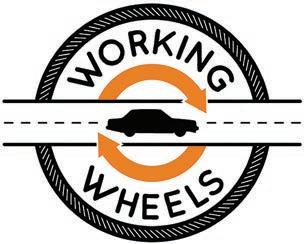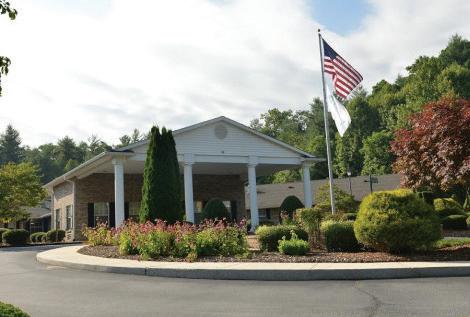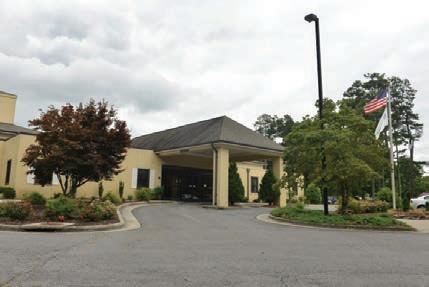
6 minute read
Donate a Car, Change a Life
Giving a Used Vehicle to Working Wheels Helps Families in Need of Reliable Transportation
People transitioning from driving are often faced with the question of what to do with their vehicles.
Advertisement
Local nonprofit Working Wheels offers a solution by accepting donations of cars, inspecting and repairing them to ensure safety and reliability, and then selling those vehicles at a deeply reduced price to people in need of reliable transportation.
“Donate a car, change a life” is the motto of Working
A Vehicle’s Next Chapter
Wheels, an Asheville-based organization that recycles and repairs donated cars, transforming them into working wheels for working families in Western North Carolina.
Working Wheels accepts vehicles in any condition and repairs as many of them as possible. The nonprofit collaborates with mechanic shops in the area who work on donated cars at a discounted price. Those vehicles that are not able to be placed in the program serve as parts cars or are sold to generate proceeds to help further the nonprofit’s mission.
How to Donate to Working Wheels
Donating a vehicle to Working Wheels begins by contacting the nonprofit by phone or through a form on their website.
After a 10-minute conversation about the vehicle, car’s title and get the vehicle to the nonprofit. Donors can then drop off cars themselves or have Working Wheels’ volunteers come drive or tow the car away. In addition to donations of vehicles, Working Wheels – a 501(c)3 nonprofit – also accepts monetary contributions to the Parts and Repair fund.
Working Wheels guides donors on how to transfer the
Can Have Big Impact
Working Wheels has helped hundreds of program participants with their transportation needs. By having reliable transportation, these individuals have been able to work more hours, choose from a wider selection of available safe options, take themselves and their families to appointments and spend more time with their loved ones.
Working Wheels partners with trusted local organizations, including Helpmate, ABCCM, and Homeward Bound, to connect cars to people in need.

“This car means that I can get to work safely and on time,” a participant named Karen said of her Working Wheels vehicle. “I have a good job, and with reliable transportation, I can advance.”
In North Carolina, motorists are required to renew their driver’s licenses every eight years. If done in person at a DMV office, a vision test must be passed. People age 66 and older are required to renew their driver’s licenses every five years.
The N.C. Division of Motor Vehicle’s Medical Review Unit Program also evaluates a driver when there are concerns that certain medical conditions – not age alone – might have an impact on the ability to safely operate a motor vehicle. For more information, visit NCDOT.
gov/DMV/License-ID/License-Suspension/ Medical-Review-Program.
Throughout Western North Carolina, there are county public transportation options. For details
on area public transportation services, turn to the Transportation, Appointments and Errands section of the Aging Resources Directory on page 104.

longer driving can be a sensitive one. Approach such a conversation with respect, directness and a focus on safety, including those of passengers, pedestrians and other drivers.
Participating in a formal driving assessment performed by a professional who is not a family member can be useful, as can meeting with a family physician who may be able to evaluate how health conditions and medications may be impacting driving ability.
Arrange Alternative Transportation
In the event that you or a loved one stops driving, discuss transportation needs and set up alternatives. Family members and friends can create driving schedules and take turns providing regular transportation. Private ride services such as cab companies, Uber and Lyft may be useful as may be public transportation options.
By having alternate transportation plans in place, you or your loved one can continue to live independently without the worry that can come with driving challenges. And while giving up driving is a transition, ceasing to drive does not have to mean disengaging from socializing, running errands or being active in the community.
HELPFUL RESOURCES
AAA’s SeniorDriving.AAA.com
American Occupational Therapy Association’s Driving and Community Mobility
AOTA.org/Practice/ Productive-Aging/Driving
A Skilled Nursing and Rehabilitation Center

Services Include: • Short-term Nursing and Rehabilitation • Long-Term Care • Outpatient Therapy • Respite Care • Palliative Care & Hospice • Veteran’s
Services
Call and Arrange Your Personal Tour at One of Our Three Beautiful Locations Today!
The Laurels of GreenTree Ridge

Perched on a scenic tree-lined ridge, The Laurels of GreenTree Ridge is located less than two miles from Memorial Mission Hospital in Asheville, North Carolina. Our 100-bed skilled nursing facility is easily accessible from Interstate 40 and the neighboring, historic Biltmore Estate. The Laurels of GreenTree Ridge provides both short-term and long-term care for its guests, emphasizing independence and high quality living.
70 Sweeten Creek Road, Asheville, NC 28803 (828) 274-7646 LaurelsOfGreenTreeRidge.com
The Laurels of Hendersonville
A 120-bed skilled nursing and rehabilitation center, The Laurels of Hendersonville is located just outside historic downtown Hendersonville. Among our many amenities is a gazebo area which provides the perfect setting for our guests to enjoy quiet time or socialization. The Laurels of Hendersonville provides long-term care, short-term rehabilitation, respite, hospice care, and veteran's services. They are able to provide IV therapy, wound care and other complex medical services to their guests.

290 Clear Creek Road, Hendersonville, NC 28792 (828) 692-6000 LaurelsOfHendersonville.com
The Laurels of Summit Ridge

Located adjacent to the beautiful Blue Ridge Parkway, The Laurels of Summit Ridge is a 60-bed skilled nursing and rehabilitation center, with a 27-bed assisted living unit, just a half mile from the VA Medical Center and five miles from Mission St. Joseph Hospital. The Laurels of Summit Ridge offers short term rehabilitation, hospice care, respite care, long term care and assisted living. We provide high quality, comprehensive health care for each guest.
100 Riceville Road, Asheville, NC 28805 (828) 299-1110 LaurelsOfSummitRidge.com
Find the Help You Need in Your Community Local Professionals Offer Range of Assistance with Aging Issues
If you’re facing issues related to aging or caregiving and need advice or assistance, help is available through a variety of regional professional resources. Councils on Aging, Area Agencies on Aging, veterans affairs agencies, the N.C. Dept. of Health and Human Services, geriatric care managers and other resources can all provide helpful information and services.

Councils on Aging and County Resources
Depending on where you live in Western North Carolina, the Council on Aging serving the county you live in may offer different services from those in other parts of the region, but they all share the common mission of acting as advocates for elders and providing connections for the assistance you need.
Council on Aging of Buncombe County
The Council on Aging of Buncombe County is an advocate for older adults, providing personal support, assistance and resource coordination to people 60 years old and older to help them stay independent and healthy.
To help older adults receive the services they need, COABC answers questions by phone and helps people complete applications for community-wide services.
COABC offers informational assistance about Medicare and health insurance. Medicare counseling and education is held in both Buncombe and Henderson counties through online webinars and one-on-one counseling by phone. COABC also assists older adults with the Affordable Care Act. continued on page 34










